

First Nations Schools Are Chronically Underfunded. According to a report by former TD Bank economist Don Drummond, the funding gap between First Nations schools vs other schools across Canada averages around 30 percent.
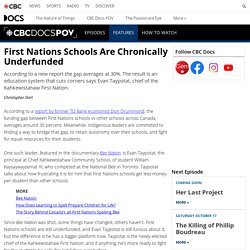
Meanwhile, Indigenous leaders are committed to finding a way to bridge that gap, to retain autonomy over their schools, and fight for equal resources for their students. One such leader, featured in the documentary Bee Nation, is Evan Taypotat, the principal at Chief Kahkewistahaw Community School, of student William Kaysaywaysemat III, who competed at the National Bee in Toronto. Taypotat talks about how frustrating it is for him that First Nations schools get less money-per-student than other schools. Circle of Life: What is the Aboriginal Worldview? #327 A Crime Reporter Exposes The Child Welfare System. Cbc.ca Podcasts. Use the links below to download a file.
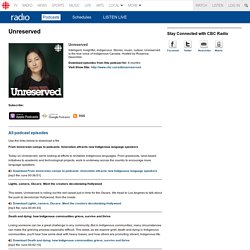
From immersion camps to podcasts: Innovation attracts new Indigenous language speakers Today on Unreserved, we're looking at efforts to revitalize Indigenous languages. From grassroots, land-based initiatives to academic and technological projects, work is underway across the country to encourage more language speakers. Download From immersion camps to podcasts: Innovation attracts new Indigenous language speakers [mp3 file: runs 00:36:51] Here's why you can't comment on stories about Indigenous issues anymore - SooToday.com. As of this week, SooToday stories on Indigenous issues won’t include comments sections, and you won’t see them shared on Facebook.
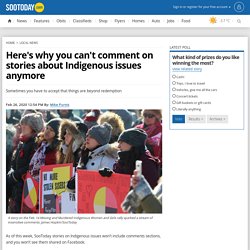
It’s not that we don’t think it’s a topic worthy of discussion. Canada’s relationship with Indigenous people is one of the most pressing things facing our country, and this community. Especially right now. - Home. Outlander – Indigenous Peoples Perspectives. The Problem of Outlander's Historical Narrative. ***Discussion of the first episode of season four*** In the opening episode of the newest season of Outlander, the main heroine, Claire, waxes poetically about the American dream to her husband, Jamie Fraser.
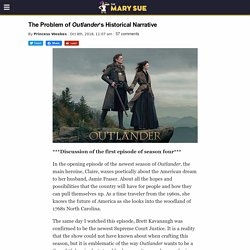
Outlander’s Thanksgiving Episode Gives the Book’s Native Americans a Much-Needed Update. This post contains frank discussion of Season 4, Episode 4 of Outlander, titled “Common Ground.”
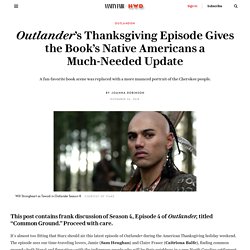
Proceed with care. It’s almost too fitting that Starz should air this latest episode of Outlander during the American Thanksgiving holiday weekend. The episode sees our time-traveling lovers, Jamie (Sam Heughan) and Claire Fraser (Caitriona Balfe), finding common ground—both literal and figurative—with the indigenous people who will be their neighbors in a new North Carolina settlement the couple have named Fraser’s Ridge, after themselves. The episode makes a radical departure from one of the more popular, show-stopping moments from Diana Gabaldon’s novel Drums of Autumn, seemingly as part of the show’s ongoing attempt to correct some problematic racial depictions in its source material. Why we need more Indigenous representation in Hollywood. Seeking representation in Hollywood one Outlander audition at a time.
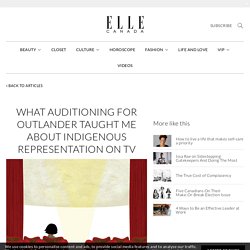
I’m sitting on a black plastic chair in the auditorium at the Native Canadian Centre of Toronto, jiggling my legs as the casting director in front of me studies my application and headshot. I’m here, along with 30 other Indigenous men and women, to audition for the role of “background actor, Indigenous, age 25-plus” for the wildly popular (and wildly sexy) series Outlander. Producers had put out a call for Indigenous extras to appear on the show’s fourth season as time-travelling English combat nurse Claire and her hunky Scottish warrior, Jamie, journey to the New World—or, as I call it, “home.” I’m jittery, but I’m excited too, and not just because if I’m picked, I’ll get to go to Scotland, where the series is filmed.
The Little-Known History of How the Canadian Government Made Inuit Wear ‘Eskimo Tags’ In-text Citations - APA 6th edition - Research Guides at NorQuest College. The 2018 CBC Massey Lectures: All Our Relations: Finding the Path Forward. ** Tanya Talaga's CBC Massey Lectures originally aired in November 2018.
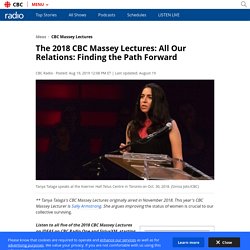
This year's CBC Massey Lecturer is Sally Armstrong. She argues improving the status of women is crucial to our collective surviving. Listen to all five of the 2018 CBC Massey Lectures on IDEAS on CBC Radio One and SiriusXM, starting at 9:00 p.m. (9:30 p.m. Cuthand: Cypress Hills hold special meaning to First Nations. The Cypress Hills hold special meaning to the First Nations, and my First Nation in particular.
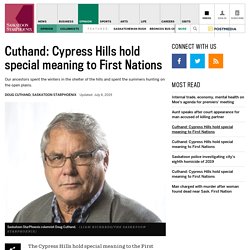
Our ancestors spent the winters in the shelter of the hills and spent the summers hunting on the open plains. Jesse Wente on the mainstream media's odious defence of genocide. When the Royal Commission on Aboriginal Peoples (RCAP) released its report in the summer of 1996, I was on a six-month internship as an associate producer at CBC Radio in Toronto, a position I took as something to do for the summer while expecting to attend film production school at Humber College that fall.

I had no intention of pursuing a career in journalism. I had just graduated from the University of Toronto with a film studies degree, the first step in what I hoped would be a career as a filmmaker. Publications. Jesse Wente on the mainstream media's odious defence of genocide. Justin Trudeau specific memes... He’s just so memeable.… Why are the deaths of Indigenous women and girls ungrievable?
“It is time to call it as it is: Canada’s past and current colonial policies, actions and inactions towards Indigenous Peoples is genocide.”
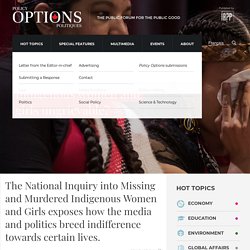
That is the underlying conclusion reached by the National Inquiry into Missing and Murdered Indigenous Women and Girls as it released its final report on June 3. It is difficult to draw a different conclusion when one considers “the sum of the social practices, assumptions, and actions” of settler colonialism, as the inquiry rightly points out in its analysis. When colonial policies and practices are considered together, the slow and agonizing death of Indigenous nations and peoples is brought into sharp relief.
But this has not been the view shared by the larger Canadian society. Dian Million: “Indigenous Feminisms’ Affective Response to State Violence" Indigenous masculinity and the lasting impacts of colonization. But Why Can’t I Wear a Hipster Headdress? “Let’s raise our children to fall in love with indigenous systems rather than attempting to destroy colonial systems from within.” “Let’s raise our children to fall in love with indigenous systems rather than attempting to destroy colonial systems from within.” Doug Cuthand: First Nations education has history of failure. Indigenous Knowledge: not a separable area of knowledge. (by Eileen Dombrowski, from OUP blog) It’s easy to miss the point entirely when treating Indigenous Knowledge in TOK.
It’s not a special “category” of knowledge, even though it is listed in our syllabus in parallel with other areas of knowledge. Clustering up indigenous groups across the world to look at their knowledge does not enable us to treat that knowledge as separate or separable from other areas of knowledge. I’m a big fan of treating Indigenous Knowledge — but specifically as a particular cultural synthesis of other areas of knowledge and as a cultural perspective within and upon the other areas.
Today I’d like to bring attention to three current topics that clearly deal with Indigenous Knowledge but, on consideration, deal equally with history, anthropology, and archeology. I’ve included links to supporting resources. 1. These selected articles from the Canadian Broadcasting Company provide background and arguments: Father-daughter duo pen book exploring how Haida principles can inform teaching. When Haida artist Robert Davidson carved and raised the first totem pole in Haida Gwaii in 1969, the first in almost nine decades, he was bringing back more than just a traditional art form.
The potlatch ceremony that family and friends held to celebrate the pole-raising marked the beginning of a re-emergence of Haida cultural practices and protocols that had long been outlawed but not forgotten. The potlatch, a gift-giving feast and an important cultural ceremony for the Haida people, was banned by the Canadian government from 1881 to 1951, but knowledge of the potlatch and other traditions were kept alive by elders. 'Bringing the threads' Davidson's daughter says it was the elders who helped with his ceremony.
Making love under Indian Acts – Briarpatch Magazine. Indigenous Perspectives Education Guide. 'I was pulled over 3 times': Stories of racial discrimination in Saskatchewan. As a First Nations person who grew up in Regina, Sask., I certainly have my fair share of discriminating stories. I got my driver's licence around the same time there were a high number of vehicle thefts happening in the city. I will never forget my first week of driving, in which I was pulled over not once, not twice, but three times. My vehicle was registered, insured and I was driving legally. It wasn't until the third time that week that I felt that it was racial discrimination. Reconciliation Regina. Reconciliation Regina is comprised of community leaders, organizations, educators, Elders/Knowledge Keepers, newcomers, survivors, healers, cultural and arts organizations, governments, youth, businesses, service agencies, faith groups and individuals committed to working in partnership to create a strengthened, healthy, vibrant, inclusive community.
Giving my children Cree names is a powerful act of reclamation. First Nations athlete says McGill's Redmen name needs to change. A First Nations athlete on McGill University's rowing team is calling on the university to change the Redmen team name. Indigenous Nationhood: Saskatchewan: The Land of Living Skies and Lethal Racism. Doug Cuthand: Change afoot among First Nations. Decolonizing the classroom: Is there space for Indigenous knowledge in academia? "Education is what got us into this mess … but education is the key to reconciliation," said Senator Murray Sinclair, who led the Truth and Reconciliation Commission.
This week on Unreserved, three years after the release of the TRC's final report, is there space for Indigenous knowledge in academia? Indigenous rights are not conditional on public opinion - Macleans.ca. In 2017, Abacus Data, in partnership with Equal Voice, released the findings of their nationwide survey about Canadians’ views on women in politics. CBC.ca. Aydin Torkabadi says just finishing his PhD thesis in Industrial Engineering was a daunting task, so it's understandable that his advisers thought it a bit strange when he asked if he could translate his abstract into Cree. After all, the Iranian born University of Regina grad student speaks four different languages, but Cree is not one of them. It wasn't the first time Torkabadi has written an abstract in a local Indigenous language. Before he moved to Regina five years ago to pursue his PhD, he lived in Malaysia while he completed his Master's at the University of Technology in Malaysia.
The program was in English, but required the abstract to be in the local language of Malay. I'm not sure if non-Indigenous academics working in Indigenous spaces realise the extent to which disagreements and challenges regarding identity and authority (cultural and scholarly) occupy the time and emotional energy of Indigenous scholars. You have. DrChrisAndersen sur Twitter : "1. this ‘pretendian’ discussion is indicative of how unprepared universities are – even (or perhaps especially) in the midst of responding to the TRC – for understanding the limits of self identification as an marker, on it’ Indigenous cinema at the NFB - Indigenous Cinema. This river by Erika MacPherson, Katherena Vermette. Reconciliation, treaties and Indigenous history in Canada: A reading list. Meeting the world's Indigenous peoples changed how I saw colonialism — and Canada.